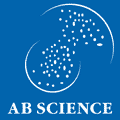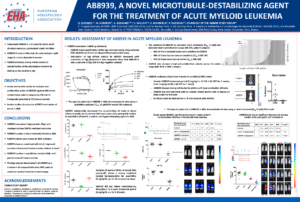Acute Myeloid Leukemia (AML) is a cancer of the myeloid line of blood cells, characterized by the rapid growth of abnormal cells that build up in the bone marrow and blood and interfere with normal blood cell production.
In patients unfit for intensive salvage chemotherapy, effective treatment options are lacking with typical complete response rates of just 20% and median overall survival of about 8 months only.
AB8939 is initially being developed in acute myeloid leukemia (AML) because cancer cells proliferate rapidly in this disease. AB8939 is 100 times more potent than doxorubicin (adriamycin), which is a reference drug in AML. Furthermore, AB8939 is not deactivated by myeloperoxidase enzyme, which is an advantage over vinca alkaloids (vincristine or vinblastine)1, 2, 3.
AB Science is planning a first in human clinical trial of AB8939 to investigate its tolerability and efficacy in patients with acute myeloid leukemia in second or third-line treatment and who are unfit to receive intensive chemotherapy. The strategy is to position AB8939 in patients with abnormal cytogenetics that make these patients unresponsive to first line therapy.
In recognition of the critical need for new treatments, AB8939 received orphan drug designation for AML from the U.S. Food and Drug Administration (FDA).
The number of patients targeted by AB8939 amounts to 80,000 in Europe and in the US (comprising patients that do not receive stem cell transplantation and who relapse after first line therapy).

